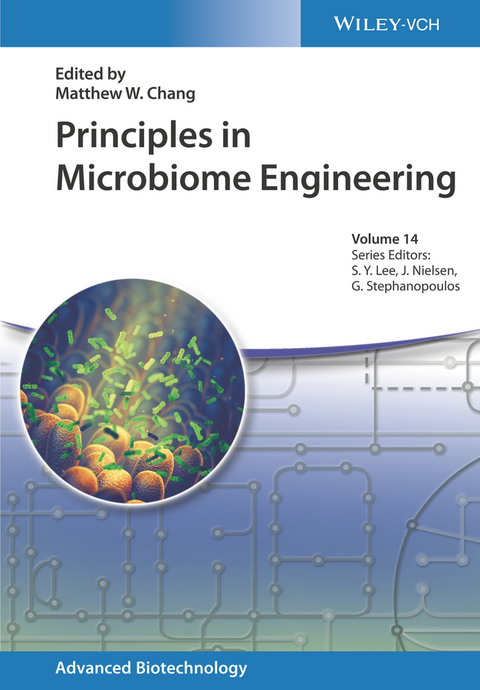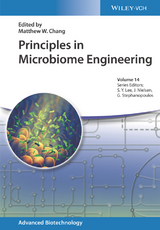Principles in Microbiome Engineering
Wiley-VCH (Verlag)
978-3-527-34725-4 (ISBN)
- Comprehensive Introduction: This book provides the necessary tools (cell and molecular biology, systems biology, synthetic biology, computational modelling and artificial intelligence) to understand the principles of microbiome.
- Range of Applications: The applications discussed in this book range from human diseases and mental disorders, to applications in the fields of husbandry, food and beverage.
- Careful Approach to a Complex Topic: This book provides an overview of essential techniques and applications to allow readers insight into the inherently complex microbial composition and host-microbe interactions of microbiome.
About the Topic:
Microbiomes are collective genomes of the microbes that live in a specific environment. Homeostasis of microbiomes can contribute to phenotypes associated with human health and physiology, agricultural productivity, and quality of the derived products. Prior to the precise modulation of microbiomes, massive efforts are being made to deepen the understanding of microbial composition and host-microbe interactions, aided by several areas such as cell and molecular biology, systems biology, synthetic biology, computational modelling and artificial intelligence. To date, significant achievements have been made in the field of microbiome, which is accelerating the pace of microbiome engineering.
This book not only introduces the reader to the necessary tools to understand microbiome but also discusses many relevant areas of current research and applications of microbiome engineering, ranging from human diseases to husbandry, food and beverage applications.
The book first discusses microbiome in the context of system biology, synthetic biology as well as computer modelling of microbiome interactions and microbiome big data.
The second part of the book introduces current research and applications of microbiome engineering in the fields of medicine (cancer, diabetes, obesity, etc.), husbandry, plant-soil, food and beverages. Lastly, it provides an outlook on future perspectives on microbiome engineering and its applications.
Matthew Chang is Associate Professor in Biochemistry in the Yong Loo Lin School of Medicine at the National University of Singapore (NUS), and Director of the Singapore Consortium for Synthetic Biology (SINERGY), Wilmar-NUS Corporate Laboratory (Wil-NUS) and NUS Synthetic Biology for Clinical and Technological Innovation (SynCTI). His research interests lie in the development of biological systems that perform programmable functions. In particular, he has pioneered the development of microbial cells programmed to perform targeted therapeutic functionalities. His scientific contributions have been recognized with international honours and awards, including the Scientific and Technological Achievement Award from U.S. Environmental Protection Agency, and featured in leading media outlets worldwide. He serves as an editor and an editorial board member for a number of journals including Cell Systems, Metabolic Engineering, Biotechnology for Biofuels, ACS Synthetic Biology, and Critical Reviews in Microbiology. He serves on the advisory committee of key international research programs such as the Synthetic Biology Open Language (SBOL) and CSIRO Future Science Platform.
Section I: Advancing understanding of microbiome
Chapter 1: Systems biology and microbiome
Chapter 2: Synthetic biology and microbiome
Chapter 3: Computational modelling of microbiome and host-microbiome interactions
Chapter 4: Machine learning of the microbiome big data
Section II: Microbiome engineering
Chapter 5: Human microbiome engineering against pathogen infections
Chapter 6: Human microbiome engineering against cancer
Chapter 7: Human microbiome engineering against diabetes
Chapter 8: Human microbiome engineering against obesity
Chapter 9: Human microbiome engineering against mental disorders
Chapter 10: Human microbiome engineering against autoimmune and inflammatory disorders
Chapter 11: Husbandry microbiome engineering
Chapter 12: Plant-soil microbiome engineering
Chapter 13: Food microbiome engineering
Chapter 14: Beverage microbiome engineering
Section III: Perspectives on microbiome engineering
Chapter 15: Future perspectives on Microbiome and its applications
| Erscheinungsdatum | 26.05.2022 |
|---|---|
| Reihe/Serie | Advanced Biotechnology |
| Mitarbeit |
Herausgeber (Serie): Sang Y. Lee, Jens Nielsen, Gregory Stephanopoulos |
| Verlagsort | Weinheim |
| Sprache | englisch |
| Maße | 170 x 244 mm |
| Gewicht | 782 g |
| Einbandart | gebunden |
| Themenwelt | Naturwissenschaften ► Biologie ► Biochemie |
| Naturwissenschaften ► Chemie ► Technische Chemie | |
| Technik ► Umwelttechnik / Biotechnologie | |
| Schlagworte | Angewandte Mikrobiologie • applied microbiology • Biotechnologie • Biotechnologie i. d. Chemie • Biotechnology • Biowissenschaften • Chemie • Chemistry • Food Processing, Production & Manufacture • Food Processing, Production & Manufacture • Food Science & Technology • Food Science & Technology • Herstellung u. Verarbeitung von Lebensmitteln • Lebensmittelforschung u. -technologie • Life Sciences • Medical Science • Medizin • Microbiology • Mikrobiologie • Mikrobiologie u. Virologie • Mikrobiom |
| ISBN-10 | 3-527-34725-9 / 3527347259 |
| ISBN-13 | 978-3-527-34725-4 / 9783527347254 |
| Zustand | Neuware |
| Informationen gemäß Produktsicherheitsverordnung (GPSR) | |
| Haben Sie eine Frage zum Produkt? |
aus dem Bereich




